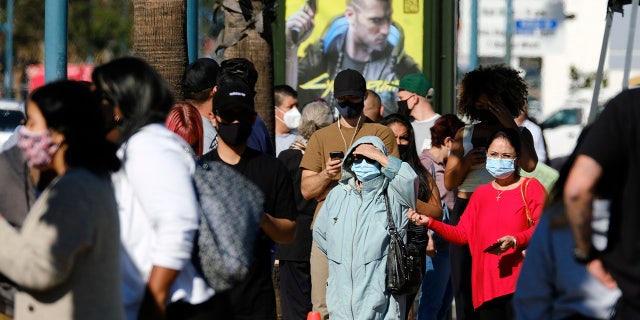LA restaurant owner who went viral after being shuttered by Mayor Garcetti joins lawsuit against Newsom
Over 50 business owners sue Gov. Newsom for outdoor dining ban
Small business owners Carl Dene and Cynthia Ariosta provide insight on ‘Fox and Friends Weekend.’
Five California businesses are suing Gov. Gavin Newsom, Attorney General Xavier Becerra and public health officer Dr. Erica Pan over the state’s coronavirus stay-at-home orders.
Lawyers representing Pineapple Hill Saloon & Grill, Luxury Nail Lounge, Pomp Salon, Bella & Harmony and Coachella Valley Hospitality Unites argue that the restrictions violate the merchants’ constitutional rights.
Angela Marsden, owner of Pineapple Hill in the Sherman Oaks neighborhood of Los Angeles, appeared in a video that went viral in December in which she claims Mayor Eric Garcetti shut down her restaurant’s outdoor patio while allowing a film crew to set up an outdoor dining area across the street.
“There is no science nor data that justifies the blanket closure of all outdoor dining and beauty services,” Harmeet K. Dhillon, managing partner of the Dhillon Law Group, Inc., said in a Friday statement. “While California continues to experience the most restrictive shelter-in-place orders in the country, the highest positive test rate and most deaths, Governor Newsom’s orders are devastating small businesses while not saving lives.”
CALIFORNIA CORONAVIRUS VACCINE ROLLOUT LAGGING BEHIND MOST STATES
Newsom’s office did not immediately respond to an inquiry from Fox News.
The lawsuit states that Newsom, Becerra and Pan have deprived small businesses of “fundamental rights protected by the U.S. and California Constitutions, including freedom of assembly and due process and equal protection under the law.”
The plaintiffs also argue that the defendants abused their power by seizing the coronavirus pandemic “to expand their authority by unprecedented lengths.”
CALIFORNIA HEALTH EXPERTS QUESTION WHETHER STATE’S OUTDOOR DINING BAN CONTRIBUTED TO CORONAVIRUS SURGE
Attorneys representing the businesses cite a peer-reviewed study published Jan. 5 in the European Journal of Clinical Investigation, examining data from the U.S., England, France, Germany, Iran, Italy, Netherlands, Spain, South Korea and Sweden, that found that mandatory stay-at-home orders and business closures did not have “significant benefits” and “reductions in case growth may be achievable with less restrictive interventions.”
People wait in line to be tested for COVID-19 at a testing site in the North Hollywood section of Los Angeles on Saturday, Dec. 5, 2020.(AP Photo/Richard Vogel)
“Cutting hair and al fresco dining are criminal acts in only one state in the United States because Governor Newsom has decided to make these industries sacrificial lambs,” Fred Jones, general counsel for the Professional Beauty Federation of California, said in a Friday statement.
The lawsuit comes on top of an effort by a group of 50 restaurants and wineries in Sonoma and Napa counties to sue Newsom, arguing that they were unfairly targeted without scientific evidence while other indoor businesses like retailers were allowed to continue operating “with little regulation.”
Newsom, a Democrat, has from the start of the pandemic said his coronavirus policy decisions would be driven by data that will be shared with the public to provide maximum transparency, but now, as the state emerges from its worst surge in cases, his administration won’t disclose key information that will help determine when his latest stay-at-home order is lifted.
CLICK HERE TO GET THE FOX NEWS APP
State health officials said they rely on a complex set of measurements that would confuse and potentially mislead the public if they were made public.
The governor imposed the nation’s first statewide shutdown in March and has since implemented some of the strictest COVID-19 rules in the country, with most of the state’s 6 million public school students still learning from home since last spring.
California Gov. Gavin Newsom speaks at a news conference at Cal Expo in Sacramento, Calif. (Daniel Kim/The Sacramento Bee via AP, Pool, File)
As cases surged after Thanksgiving, Newsom created five regions and established a single measurement — ICU capacity — as the determination for whether a region was placed under a stay-at-home order. In short order, four regions — about 98% of the state’s population — were under the restrictions after their capacity fell below the 15% threshold. A map updated daily tracks each region’s capacity.
At the start of last week, no regions appeared likely to have the stay-at-home order lifted soon because their capacity was well below 15%. But within a day, the state announced it was lifting the order for the 13-county greater Sacramento area.
CA ATTORNEY GENERAL LAUNCHES CIVIL RIGHTS PROBE OF LOS ANGELES SHERIFF’S DEPARTMENT
Suddenly, outdoor dining and worship services in that region were permitted again. Hair and nail salons and other businesses could also reopen, and retailers were allowed more shoppers inside.
Local officials and businesses were caught off-guard. State officials did not describe their reasoning, other than to say it was based on a projection for ICU capacity.
California became the nation’s epicenter for the virus in December, but it has fared better in the new year. The 23,024 new cases reported Friday are less than half the mid-December peak of nearly 54,000.
The Associated Press contributed to this report.
Source: Read Full Article


